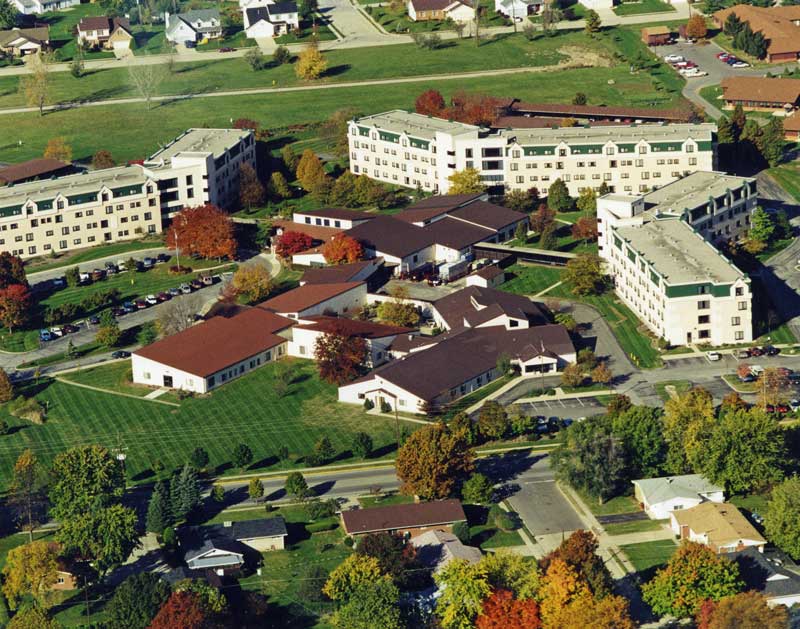Can My Parents Afford a Life Plan Community?

Will My Parents Be Able to Afford a Life Plan Community?
When you and your family members compare retirement communities in West Lafayette, IN, you will naturally focus on the types of contracts and payment plans each one offers.
As you examine those that fit your needs, it’s important to assess senior living costs and their possible impact on your finances. How will paying an entrance fee, monthly fees and the cost of care affect your savings? Do you see living in a community as a long-term decision (more than 10 years)? Will health care services eventually be needed? Would a Life Care contract make more financial sense, or are you comfortable with the potentially higher costs with a fee-for-service contract? These and other questions are important to ask yourself when determining the affordability of one community over another.
What does a Life Plan Community offer?
A Life Plan Community (also known as a CCRC or continuing care retirement community) provides a “plan for life.” Our community refers to this type of community, our community, as hybrid living. At the core of every Life Plan Community is independent living, with a lifestyle sometimes likened to being on a cruise ship: a maintenance-free residence, dining, and on-campus amenities such as a pool and fitness center. A Life Plan Community includes on-campus health care, which may include assisted living, memory care, skilled nursing and rehabilitation. When care is needed, residents won’t have to move away from the community. This is particularly advantageous for couples, for when one spouse needs care, the other can stay in independent living.
What is the cost of a Life Plan Community?
Senior living costs vary widely between communities and depend on the size and type of residence selected, and the number of people who will be living in it. Most communities require an upfront deposit or entrance fee for someone to become a resident, and a fixed fee thereafter for monthly expenses. Communities use entrance fees to reinvest in their amenities and services and keep monthly fees stable.
There are several types of contracts offered by Life Plan Communities. The Life Care contract is the most comprehensive, as it offers a robust plan for long-term health care in addition to residential living. Residents can rely on access to high-quality health care if they ever need it and won’t pay more as they travel through the care continuum. Life Plan Communities with a Life Care contract are usually referred to as “Life Plan communities.” The communities that don’t offer this agreement may offer other types of contracts, such as rental, modified month-to-month, or pay-as-you-go contracts.
What are the financial advantages a Life Plan community ?
The all-inclusive concept of a Life Plan community can buffer unexpected health costs. In general, older adults 65+ spend roughly 75% of their income on five main categories: housing, food, clothing, transportation and health care. Spending appears to go up with age: Adults ages 75+ spend nearly 80% of their income on these categories. This leaves around 20% to 25% of income available to pay for anything outside these necessities. If the person has a health event such as a serious illness or fall, or needs surgery or a hospital stay, there’s usually no room to cut back on spending to pay for unexpected medical expenses. In a Life Plan community, a benefit is access to a continuum of on-campus care is included, at a predictable rate.
It’s also wise to note that moving to a Life Plan community earlier rather than later is also cheaper in the long run. It allows older adults to amortize senior living costs over the longer period of living there. Since they are no longer homeowners, they no longer pay property tax, and may be eligible for tax breaks on both their entrance and monthly fees. (Consult a tax professional to determine individual eligibility.)
How do seniors pay for a Life Plan community?
The cost of a Life Plan Community is usually more affordable than expected. For most older adults, what they pay to live in a senior living community is comparable to or less than the cost of their typical recurring expenses. Depending on individual preference, assets and insurance, some of the most common ways seniors afford a community’s fees include using proceeds from selling their home, retirement income, savings, investments or pension funds.
Seniors also use bridge financing, a type of short-term lending that bridges a time gap between the sale of a house and moving into the community. In some cases, long-term care insurance — depending on the state, policy and benefit — will cover the cost of assisted living. In some instances, Medicare may pay for certain health care services at a Life Plan Community. Communities that ask for an entrance fee often have a certain repayable amount if the resident leaves or passes away. This guarantees a legacy for the resident’s heirs.
What’s the value of a Life Plan community?
For someone on a retirement income, moving to a Life Plan Community can provide peace of mind when it comes to expenses. The cost of daily necessities is all included in the fixed monthly fee, and if the need ever arises, quality health care is available on campus at a predictable cost. While agreements may vary from community to community, those with a Life Care contract typically guarantee benevolent support: if a resident runs out of funds through no fault of their own, they can stay in the community and receive the care they need. All this offers a measure of financial predictability that a senior may not have in their current home.
How to “have it all.”
If you’re attracted to the idea of Life Plan aka hybrid living, but would like more flexibility in how you pay for what you need, explore Westminster Village. Our retirement community in West Lafayette, IN, offers a wider variety of housing choices, including a new concept in residential living: “hybrid homes.” These high-tech homes with innovative touches offer unprecedented financial flexibility — they allow you to design the lifestyle you want by paying only for the services you need, all the while enjoying community amenities. It’s immensely successful, and we’re eager to tell you more — contact us using the form on this page.



